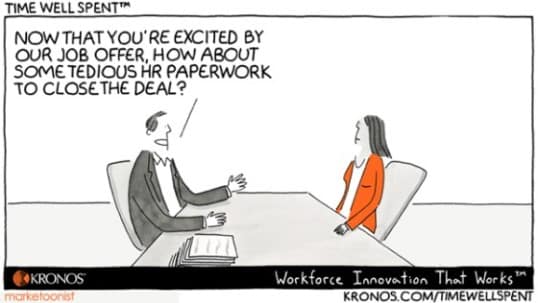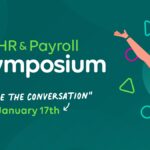(Editor’s Note: Today’s post is brought to you by our friends at Kronos, the global leader in delivering workforce management solutions in the cloud. Tens of thousands of organizations in more than 100 countries – including more than half of the Fortune 1000® – use Kronos to control labor costs, minimize compliance risk, and improve workforce productivity. Enjoy the post!)
I learned a long time ago that the key to a good customer experience is making your product “easy to buy and easy to use.” Customers don’t want to jump through a bunch of hoops to buy stuff. And they want to be able to intuitively use the product.
Years later, with the popularity of social media, I added that it should be “easy to share.” We’ve become accustomed to telling others about our favorite brands. Companies should want us to tell our stories about their products or services. Of course, if you don’t have a good brand…well, let’s save that for another post.
Today’s Time Well Spent from our friends at Kronos reminded me that the same philosophy applies to the hiring experience. Candidates want to be able to easily apply for jobs, get hired without too much aggravation, and share their great experience with others.
The latest reports show the unemployment rate at 4.9 percent. The Society for Human Resource Management reports that quits are at their highest rate since 2008. Candidates are clearly in the driver’s seat. Let me rephrase that…the best candidates are clearly in the driver’s seat.
If your organization is looking for top talent, the hiring experience needs to be candidate-friendly. That means finding a way to turn that tedious paperwork activity into something easier. Yes, it’s true that part of the paperwork process is benefits, which employees clearly want. But that doesn’t mean it has to be painful. Another piece of the process is compliance. Technology solutions are addressing that issue by making paperwork processing consistent, scalable, and customized to organizational needs.
The value of having a positive and hassle-free candidate experience cannot be emphasized enough. Organizations need to address the entire experience, not just one part of the hiring process. Having a great interview process, but then making the candidate spend hours on tedious paperwork sends a mixed message. I wonder how many candidates lose their enthusiasm as a result?








Harold Ingmire says
I study articles on this subject as I see the commentary repeated by many recruiting professionals, and of course as part of the marketing spiel of systems sales people that make the hiring process so easy and paper free.
Has no one heard of the requirements of the EEOC, OFCCP, IRS, ICE, other miscellaneous DOL divisions demanding their own unique forms. The “HR press” keeps telling people that HR wastes their time on this stuff but gosh, 98% is driven by Federal and State requirements.
I have reviewed numerous “systems” designed to automate this process, but it still doesn’t get around our government. Oh how I long for an official government ID card that has all that data on it we can just scan in – you know stuff like name, SSN, criminal record, gender, race, disability, veteran status – but that is another book for someone to write.
Wendy says
Yes. We all agree the paperwork process sucks. So what are your actual recommendations for collecting all that information we need to or actual recommendations for making the benefits process easier? I see so many posts saying this same thing but no one has any actual suggestions.
Amy Willyard says
Great article – automation and e-signing as much as possible has been a gamechanger for us! We also put all of our benefit info and enrollment process on a website (not that expensive) and so now that entire process is paperless as well. This was all super easy to implement and was not a financial burden – we are a small’ish company . It was just a matter of needing to make it happen as we are projecting to hire a ton – and the paperwork was going to bury us. I got tired of seeing the glazed over faces of our new hires. Plus they lost half the paperwork anyway… I was constantly chasing people down for a signature, ugh.
We have our new hires fill out as much of their required paperwork prior to day 1 so it minimizes that feeling of “tons of paperwork” when they arrive. It is simply expected that they will arrive with much of it already completed.
I love this post – getting us to paperless was really just a bunch of small changes – but it definitely changed the impression of their first day experience – they aren’t spending the time buried in a bunch of forms – so more time is spent ENGAGING and forming meaningful relationships with their team right out of the gate.
Keith says
First off, I’m SO pleased to see actual questions and discussions here vs. the usual comment section entries of “I agree!” or “Ya!”
When I worked for a company that was a government contractor the amount of paperwork was UNbelievable.
So depending on your industry and very much on your State and its regulations, you may have to deal with physical paper. A lot. Price of business (and electing/supporting Big Government systems and pol’s).
With RightSignature and DocuSign-like companies, small groups like mine have a much easier time. As the other commenter said, having a website for this info helps tons, too.
The pitfall I see is a lot of HR (and IT) folks think that just because its less paper clips and more mouse clicks, things don’t need to be streamlined anymore. A ton of materials to review can be just as much a bummer as signing a stack of paper in front of you. So I’m in favor of massive streamlining and being to the point in all of this. After all, common sense is one reason HR exists, and common sense is a rarity these days, IMHO.
PS-The exec (CEO, me thinks) of fast fooder Carl’s Jr. is moving their headquarters from CA to Nashville, TN. He just gave an interview this week about looking into making a human-free experience in future stores. 100% automated. So this tech thing sure can help us, but with our industry having the word/term “human” in the title, we should continue to be worried. Another topic, but related.
Love your site, Sharlyn! Been a regular reader for over a year now, I pass it on to everyone; a “must” resource for any HR pro. Keep up the amazing work!
Jason Cavness says
I don’t think anyone disagrees that we as HR professionals have to collect all of the compliance data. I believe the point of the article is that we need to eliminate the hassle from the process as best we can.
For example, why do so many companies want a copy of your resume and then ask you to fill out an on line application asking the exact same questions that can be found on your resume?
Or why do some companies have the exact same on line application regardless of the position?
If we are making the hiring process problematic and full of hassle we are sending the message that their time with our company will also be problematic and full of hassle.
Harold Ingmire says
We all share similar pain. One point of information to Mr. Cavness on resume versus application.
1. Most applications require a signature verifying the data is accurate, etc., whereas resumes no-so-much. Personally I see resumes as a “personal marketing tool” and sales pitch, which it should be of course. The application is a specific legal document. The system I use does collect the data when a person applies online and they do an electronic signature with the same force of law.
2. Applications normally ask for specific data not available on most resumes 0r very skimpy. Wage data, supervisor names, specific employment dates and other data that can be legally asked pre-hire.
Of course it is your personal risk assessment how you want to handle this data.
Don’t forget, we still have the Paperwork Reduction Act of 1995 by VP Al Gore – great idea but hated by bureaucrats.
Sharlyn Lauby says
Thank you so much for all of the terrific comments!
@Wendy – You’ve really challenged me. Thank you so much. I promise we will have more for you on this topic.
@Amy – Thanks for sharing. I’m seeing more solutions tailored for small and medium-sized businesses. Using technology to gain efficiencies isn’t a “large company” thing anymore.
@Keith – Totally agree that there’s a difference in using technology and actually benefitting from it. Thanks for the kind words about HR Bartender. I very much appreciate it.
@Jason – Agreed. I think it’s valuable for HR to audit their hiring processes to eliminate duplication of efforts. Thanks for the comment.
@Harold – Good point regarding the legal differences between resumes and applications. Thanks!